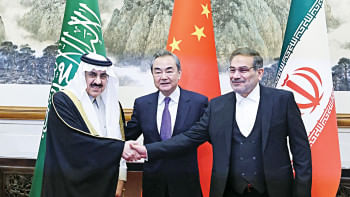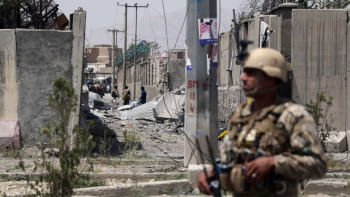Iran-Saudi detente can be a game-changer

We would like to congratulate the Saudi and Iranian authorities for having the wisdom and far-sightedness to agree on restoring bilateral ties between the two nations. For helping to bring this about, China deserves a lot of credit. For Bangladesh, as a Muslim-majority country that has always pursued a policy of peaceful coexistence with all other countries, it is indeed very encouraging. At a time when the world is mired in increased uncertainties and chaos, the decision by Saudi Arabia and Iran to try and find ways of communication is an optimistic sign. It has the potential to benefit the whole world, and the region in particular. As such, we hope other countries, particularly Western countries, and especially the US, will see it in a positive light.
We understand that Iran and Saudi Arabia have many longstanding issues and historical disagreements. It would be naïve to think that they can sort out all their disputes overnight. The two countries will have to put in concerted efforts, over considerable periods of time, to build trust, which could eventually lead to the two finding solutions to many of their disagreements. But the fact that the agreement was signed after two years of difficult negotiations holds promise. And that officials from both sides have expressed their desire to find common ground on the basis of each side refraining from intervening in each other's internal affairs, and also from engaging in a costly arms race, further raises hope of a long-term rapprochement.
Tension between Saudi Arabia and Iran, as well as many of the decisions taken by both sides as a result of the mistrust that had developed over many decades, have proven to be disastrous for the people of the Middle East. The proxy wars in Yemen and Syria, for example, have led to some of the worst devastations in recent memory. Therefore, ending these wars, especially the one in Yemen – which has resulted in one of the largest humanitarian crises of modern times, as described by various UN agencies – should weigh heavily on their agendas.
Needless to say, the Shia-majority Iran and the Sunni-majority Saudi Arabia are seen as leaders of their respective sects by millions of people of the Islamic faith. Therefore, the rift that has developed between the two countries has obviously had a massive influence on these people. Should the two sides succeed in coming together in the interest of peaceful coexistence, it could have an extremely positive affect on overall regional peace and security.
The US, on the other hand, should not see the role played by China in mediating the agreement as a sign of dwindling US influence in the region. The US still has a massive role to play in the Middle East and, as such, should not look to derail the agreement in any way. With the world economy in dire straits, we hope Saudi Arabia and Iran will also look to work together to alleviate the anguishes being felt by billions of people around the world.


 For all latest news, follow The Daily Star's Google News channel.
For all latest news, follow The Daily Star's Google News channel. 






Comments